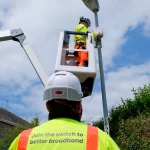UPD4 Government Consult on 3 Options for UK ISP Adult Website Censorship
The UK governments Department for Education (DfE) has, in response to the recent Parliamentary Inquiry into Online Child Protection, today launched a new public consultation that proposes three potential options for handling the censorship of adult websites and related internet content by broadband ISPs.
April’s controversial inquiry, which was conducted by the outspoken Conservative MP for Wiltshire, Claire Perry, called on the government to “urgently review the implementation plans” for its voluntary Active Choice system that was launched last year. Perry also demanded an “accelerated implementation timetable“.
Advertisement
Last October four of the UK’s biggest broadband providers, BT, Sky Broadband, TalkTalk and Virgin Media, agreed to help protect children online (here) via a new Code of Practice that, among other things, would provide customers (e.g. parents) with an “enforced” option to block adult web content at the point of purchase (Active Choice).
So far, with the exception of TalkTalk’s network-level HomeSafe filtering system, many ISPs have simply decided to offer customers the option of being able to download free Parental Control software. But Perry wants ISPs to go much further and the new consultation sets out what options are on the table.
Option 1 – Automatic Block on Adult Websites (Opt-In)
This solution would effectively block all adult websites without really giving consumers a choice during sign-up. You’d have to contact your ISP to get it removed, similar to what mobile operators already do.
Option 2 – Active Choice
As explained earlier, subscribers would be given a choice during sign-up for a new ISP but they still have to specifically opt-in if they want to enable such filtering.
Option 3 – Active Choice Plus
The new version of Active Choice, which essentially enables adult website filtering by default. Customers would instead be given an option to opt-out during sign-up. This would include giving the subscriber a choice of content types that they could block (social networking etc.).
It should perhaps be noted that “adult” content, within the above proposal, is largely assumed to cover pornography, violence, gambling and sites that promote self-harm or suicide (account holders are likely to be given a list of site types to which a block can be applied). Furthermore sites that expose children to cyber-bulling or sexual grooming are also likely to be included.
Suffice to say that some of these definitions could easily be stretched to cover social networking sites, such as Facebook or Twitter, and possibly even online multiplayer games and their related communities. Clothing stores that sell underwear and legitimate sexual or medical education content could also be hit.
Advertisement
The government should be careful here as wrapping children in cotton wool and preventing them from talking or playing with their friends and family would risk becoming very counterproductive. But at least the government recognises that such filtering can’t be 100% effective.
Tim Loughton MP, Children’s Minister, said (BBC):
“Many want to take responsibility, but all too often they do not how know how because they find the technology too difficult to use or their children are more technically advanced then they are.
There is no silver bullet to solve this. No filter can ever be 100% foolproof. There is a cottage industry of people, mostly operating outside the UK, continually creating and proliferating ‘proxy’ websites that provide links to adult and harmful content.
Automatic filtering on its own risks lulling parents into a false sense of security and there can never be any substitute for parents taking responsibility for how, when and where their children use the internet. The answer lies in finding ways to combine technical solutions with better education, information and, if necessary regulation further down the line.”
As usual it’s important to point out that all internet censorship (filtering) systems have a tendency to block legitimate sites, often due to a mix of technical error or poor categorisation. Mission creep can be very dangerous; sometimes you have to tolerate a little bad in order to preserve wider freedom.
Sadly big ISPs are also slow to resolve such problems, fail to provide any form of adequate appeals process or simply ignore related complaints unless a big enough PR storm is created for them to start caring. Curiously this aspect is frequently ignored by the government.
At the same time internet filters are almost equally easy to circumvent (web blocking is only skin deep as the related content is not physically removed from the internet), cost money (a huge issue for smaller ISPs) and often aren’t even needed because there are plenty of free solutions that exist already (most ISPs already offer them). Some parent’s might find these hard to use but most should be easy.
Advertisement
At the time of writing the full consultation has yet to be published but it should eventually appear at the link below.
DfE Parental Control Consultation
http://www.education.gov.uk/consultations/index.cfm?action=consultationDetails&consultationId=1838&external=no&menu=1
UPDATE 10:37am
The consultation has been released, link above. It will run until 6th September 2012.
UPDATE 12:30pm
The UK Internet Service Providers Association (ISPA) has now given their reaction.
Nicholas Lansman, ISPA Secretary General, said:
“ISPA supports active choice and welcomes the consultation as a way of providing some much needed clarity to the area. We hope this refocuses the debate on the most effective way to control access to inappropriate material rather than about default blocking of pornography.
ISPs are committed to making the internet a safer place and offer their customers a number of different ways to protect themselves online, be it on a router, device or network level, or through education and awareness. The Active Choice agenda, recommended by Reg Bailey, covers retailers, device manufactures and ISPs, and a number of players are already offering or working towards this.
We agree with the Children’s Minister Tim Loughton that default filtering lessens parental mediation and should not be viewed as a silver bullet. The most effective way to control access to inappropriate content is to raise awareness amongst parents of the tools available to support and empower parental decision-making.”
UPDATE 12:38pm
Now a comment from the Open Rights Group (ORG) has just arrived.
Jim Killock, Executive Director of the Open Rights Group, said:
“This can of worms pushes censorship technologies and could damage access to perfectly legitimate and innocent websites.
Giving parents tools is great, but ‘Nanny State’ filtering using government approved technologies is bound to fail the people it is designed to protect.
This is a Government looking for headline grabbing solutions to complex solutions. They need to think again.”
UPDATE 29th June 2012
The government’s Parental Internet Controls consultation website has now been taken down after a data breach exposed confidential personal details, specifically of those whom had submitted a response, to the public. Participants whom had completed the survey complained that they could then simply click on the link to view their response and were instead presented with another person’s data (here). The Information Commissions Office (ICO) is also investigating.
Mark is a professional technology writer, IT consultant and computer engineer from Dorset (England), he also founded ISPreview in 1999 and enjoys analysing the latest telecoms and broadband developments. Find me on X (Twitter), Mastodon, Facebook, BlueSky, Threads.net and Linkedin.
« Griffin Wins Best UK ISP at Comms Business Awards 2012
UK ISP FidoNet Doubles its Broadband Usage Allowances »

















































Comments are closed